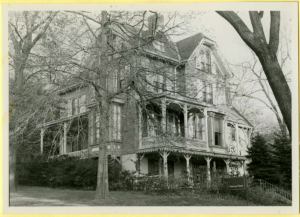Housing survey provides inappropriate and invasive questions with limited answers to students at Chatham University
December 2, 2019
By Abbey Sullivan
Shawn McQuillan, Director of Residence Life at Chatham University, sent an email on Oct. 25 to the on-campus student body with an optional bi-annual survey titled the “resident assessment survey.” It was described as “a survey designed to obtain feedback regarding [student] satisfaction with [students’] on-campus living experience.”
Students who completed the survey were entered in a raffle to win a gift card.
Upon just the first glance at this survey, its issues became clear. There are three distinct questions that stand out as invasive and without direction.
- Q: What is your gender? Male, Female, Transgender, Other or prefer not to answer
- Q: What is your sexual orientation? Heterosexual or straight, bisexual, gay or lesbian, unsure or questioning, other or prefer not to answer
- Q: Are you an international student (i.e., not a U.S. citizen or permanent citizen)?


These inquiries are clearly aimed at seeking out analytics about Chatham’s student population, but that’s something the email failed to disclose. Also, while participants were assured anonymity, who needs to know this information? It came across as untrustworthy to request such intimate information about students, without proper context or explanation.
Furthermore, the wording of these questions sounds ignorant and insensitive, with special attention to the first question regarding students’ gender identity. (In the survey, this question was asked after students were prompted to identify which residence hall/apartment they reside in.)
To refer to transgender students collectively as their own category — yet as a separate category from “male” and “female” students — is confusing and, simply put, derogatory. This implies that transgender students don’t identify as “male” or “female.” The language of this question needs to be improved with further awareness and education.
The question about sexual orientation poses a similar issue. If the survey isn’t for demographic information, why does the University need to know this to learn more about students’ on-campus living experiences? And why does the University need to know if students are “questioning” their sexual orientation? To ask for such information delegitimizes an individual’s process of self-realization and expression and may even “out” students against their wishes.
Finally, including “not a U.S. citizen” as a criterion for international students also comes across as invasive, especially without the context of why these details are needed, what they’ll be used for and by whom.
The argument may be made that this assessment doubles in objective, that it aims to both record student satisfaction with on-campus housing and serve as a demographic survey for the student body. This makes little sense, though, because the survey is voluntary and bi-annual. Consequently, its results would be incomplete and awkwardly spaced out in time.
I don’t believe the assessment was written maliciously, nor do I believe these questions were made to be intentionally uncomfortable. However, there should be some recourse to remedy the situation. Many groups of students at Chatham have expressed grievances regarding representation and insensitive University practices akin to the diction in this voluntary residence life survey.
Chatham should quickly disclose where the information given in this assessment goes. Nowhere in the email from Residence Life did the University explain how it planned to use such detailed information. Sharing those details would help create a stronger sense of trust and transparency for those who take it and could help promote more participation in similar surveys down the road.





